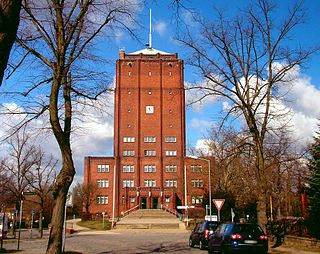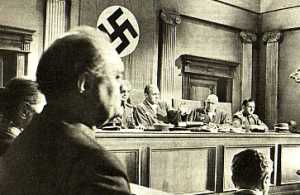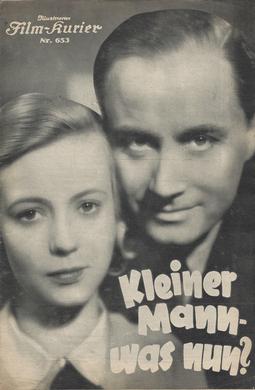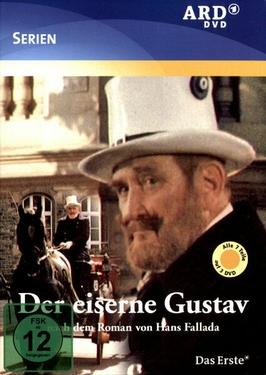Related Research Articles

Hans Fallada was a German writer of the first half of the 20th century. Some of his better known novels include Little Man, What Now? (1932) and Every Man Dies Alone (1947). His works belong predominantly to the New Objectivity literary style, a style associated with an emotionless reportage approach, with precision of detail, and a veneration for 'the fact'. Fallada's pseudonym derives from a combination of characters found in the Grimm's Fairy Tales: The titular protagonist of Hans in Luck, and Falada the magical talking horse in The Goose Girl.

Thomas Brussig is a German writer best known for his satirical novels that deal with the German Democratic Republic.

Wolfgang Staudte, born Georg Friedrich Staudte, was a German film director, script writer and actor. He was born in Saarbrücken.

Neumünster is a city in the middle of Schleswig-Holstein, Germany. With more than 79,000 registered inhabitants, it is the fourth-largest municipality in Schleswig-Holstein. The Holstenhallen and the Stadthalle make the city an important trade fair location.

Heinrich Wilhelm "Heinz" Rühmann was a German film actor who appeared in over 100 films between 1926 and 1993. He is one of the most famous and popular German actors of the 20th century, and is considered a German film legend. Rühmann is best known for playing the part of a comic ordinary citizen in film comedies such as Three from the Filling Station and The Punch Bowl. During his later years, he was also a respected character actor in films such as The Captain from Köpenick and It Happened in Broad Daylight. His only English-speaking movie was the 1965 Ship of Fools.
The Golden Twenties was a particular vibrant period in the history of Berlin. After the Greater Berlin Act, the city became the third largest municipality in the world and experienced its heyday as a major world city. It was known for its leadership roles in science, the humanities, art, music, film, architecture, higher education, government, diplomacy and industries.

Gustav Adolf Joachim Rüdiger Graf von der Goltz was a German army general during the First World War. He commanded the Baltic Sea Division, which successfully intervened in the Finnish Civil War in the spring of 1918. Goltz stayed with his troops in Finland until December 1918 representing German interests, and in practice ruled the country as a military dictator during this period. After the Armistice of 11 November 1918, Goltz commanded the army of the local German-established government of Latvia, which in 1919 was instrumental in the defeat of the Russian Bolsheviks and their local allies in Latvia. The troops commanded by Goltz suffered a defeat against Estonia in 1919 and were eventually unsuccessful in retaining German control over Latvia and Estonia after World War I.

Neuenhagen bei Berlin is a municipality in the district Märkisch-Oderland of Brandenburg, Germany. It is situated 19 km east of central Berlin, and was founded around 1230.

Little Man, What Now? is a novel by Hans Fallada, which although first published in June 1932, is set between 1930 and November 1932. The book was an immediate success in Germany, given its intense descriptions of the harsh life in the years after the Stock Market Crash of 1929 and the first years of the Great Depression. The book was also the breakthrough for Fallada as a writer of fiction.
Egon Monk was a German actor, director and author.
The Hans Fallada Prize is a German literary prize given by the city of Neumünster in the German state of Schleswig-Holstein. Since 1981 it typically awarded every two years to a young author from the German-speaking world. It is named in honor of Hans Fallada, a famous 20th-century German author known for addressing political and social problems of his day in fiction.

Jeder stirbt für sich allein is a 1962 West German made for television political drama film based on a best-selling 1947 novel by Hans Fallada, itself based on the true story of a working class couple, Otto and Elise Hampel, who committed acts of civil disobedience against the government of Nazi Germany and were executed. Directed by former German Resistance member Falk Harnack—whose brother, sister-in-law and cousins were executed during the Nazi regime—it was the first screen adaptation of Fallada's novel.
![<i>Everyone Dies Alone</i> 1976 [[West Germany]] film](https://upload.wikimedia.org/wikipedia/en/thumb/4/4e/Jeder_stirbt_f%C3%BCr_sich_allein_%281975%29.jpg/320px-Jeder_stirbt_f%C3%BCr_sich_allein_%281975%29.jpg)
Everyone Dies Alone / Alone in Berlin is a 1976 West German drama film adapted from the Hans Fallada novel Every Man Dies Alone. The book was based on the story of two ordinary Germans, Otto and Elise Hampel, who committed acts of civil disobedience against the Third Reich, were caught and sentenced to death.
![<i>Jeder stirbt für sich allein</i> (1970 miniseries) 1970 [[East Germany]] TV series or program](https://upload.wikimedia.org/wikipedia/en/6/61/Jeder_stirbt_f%C3%BCr_sich_allein_%281970_DDR%29.jpg)
Jeder stirbt für sich allein (1970) is a German television miniseries produced by DEFA in the former German Democratic Republic. The story was adapted from the 1947 Hans Fallada novel, Every Man Dies Alone, known in the UK as Alone in Berlin. It was directed by Hans-Joachim Kasprzik and starred Erwin Geschonneck.
Geheimakte W.B.1 is a 1942 German drama film directed by Herbert Selpin and starring Alexander Golling, Eva Immermann and Richard Häussler. The film portrays Wilhelm Bauer and his work on developing the submarine. It was based on the novel Der Eiserne Seehund by Hans Arthur Thies.

Iron Gustav is a 1958 West German comedy film directed by George Hurdalek and starring Heinz Rühmann, Lucie Mannheim and Karin Baal. It is based on the real story of cab driver Gustav Hartmann who drove his droshky from Berlin to Paris. The story was previously made into a novel in 1938 and later into a television series of the same title in the 1970s.

Little Man, What Now? is a 1933 German drama film directed by Fritz Wendhausen and starring Hermann Thimig, Hertha Thiele and Viktor de Kowa. It is an adaptation of the novel of the same name by Hans Fallada. The original concept for the film was to take a naturalistic approach, the same way the novel did, with Kurt Weill composing the music. Fallada had already remarked in 1932, after falling out with the producers and script writers, that the film had little to do with his novel, and that the script writers "would take a different approach," which they did. The Nazi Film Review Office insisted on extensive cuts, including all scenes featuring the Comedian Harmonists.

Hans Rehfisch, also known as Hans José Rehfisch or H.J. Rehfisch, was a German playwright, short story writer and film script writer.

Iron Gustav is West German television series which originally aired on ARD in seven episodes between 27 August and 8 October 1979. It is based on the 1938 novel Iron Gustav by Hans Fallada about a Berlin taxi driver still using a horse-drawn carriage, and the hardships he faces due to increasing competition from motor cars in the Weimar Era. In 1928 to demonstrate what he can still do he takes his carriage from Berlin to Paris.

Once a Jailbird, also published in English as Who Once Eats Out of the Tin Bowl and The World Outside, is a 1934 novel by the German writer Hans Fallada. It is about a man who is released from prison and tries to create an orderly life for himself in Hamburg, but becomes ensnared by destructive habits.
References
- ↑ Woll, Silvia (2019). "4.5 Der eiserne Gustav (1938)". In Gustav Frank; Stefan Scherer (eds.). Hans-Fallada-Handbuch. Berlin, Boston: De Gruyter. pp. 395–407. doi:10.1515/9783110282146-033.
- ↑ Rentschler, Eric. German Film & Literature. Routledge, 2013. p. 456.